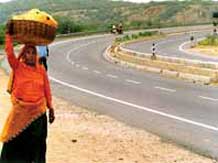Traveling to different developed countries as a teenager, I would be impressed by the roads, airports and continuous power supply available always. Yet, one would long to return to the warmth of our motherland, India. But, the sorry state of the airports, roads and the impending electricity cuts would immediately meet and greet me. These would make one hope fervently that our India be better than the best when it came to physical infrastructure, too.
Over the years, except for some pockets and cities, our country is still far from even being as good as the rest. We are still grappling with the challenges of urbanisation and the related issues of roads, airports, electricity and water, among others.
Traditionally, world over, the public sector has dealt with infrastructure projects. Since 2000, however, these are increasingly implemented in the Public-Private Partnership (PPP) mode with debt and equity. A profit-seeking private sector is believed to be more efficient, cost conscious, customer-focused, delivers faster and brings better value for money and enhanced innovations.
This augments the often constrained state budget too and government can get things done without having to raise taxes or issue bonds.
Interestingly, history tells us that the first railway line in India, as also many other lines, was actually built in a PPP mode. The 30-km-long Bombay to Thane railway line was built in 1849 by the Great India Peninsula Railway Company!
Today, studies show that infra-investment leads to a one-for-one percentage increase in GDP.
Clearly, inadequate infrastructure hinders economic growth. India’s infrastructure forecasts an investment need of a trillion dollars from 2012 to 2017.
Way back in 2001, I remember zipping through the squeaky new Vadodara-Halol toll road, which really felt like a driver’s paradise! Over the years, toll roads have made travel easier and pleasant, saving precious time. Yet, some questions were doing the rounds in my mind. Would these tolls further alienate the ‘haves’ from the ‘have-nots’? Would world-class infrastructure ‘take a toll’ on the economically disadvantaged sections, further accentuating the gap?
Last week, I had participated in a case study session on the brown-field project of refurbishing the Mumbai airport. One understood the serious challenges & risks encountered and the many innovative ways in which the project was designed and built. A state-of-the-art airport, this has been ranked as the third top airport of the world. During the discussions, there was a ‘voila’ moment! I realized that the major revenue would be from the non-core or the non-aero sector.
This includes restaurants, hotels and shops in the airport.
Only about 30% of the revenue would be from user charges, which would be regulated. This win-win proposition answered my knotty concerns, ensuring low, regulated user charges yet providing excellent facilities for all!
More and more infra projects in the PPP mode would also mean greater awareness for sustainable, eco-friendly designs with sufficient concerns for the social dimensions.
Each time we pay a toll, turn on a switch or enter an airport, let us pause and reflect. Let us bridge the 1 trillion dollar infrastructure gap across the coming five years and empower the 1.2 billion aspiring Indians. Infrastructure that boosts the quality of life, productivity and economy of our nation would make India a special paradise on earth.
“There is a huge need and a huge opportunity to get everyone in the world connected, to give everyone a voice and to help transform society for the future. The scale of the technology and infrastructure that must be built is unprecedented, and we believe this is the most important problem we can focus on.” Mark Zuckerberg
The author is a Harvard educated civil servant and writer, now working in the education sector
SOURCE-http://www.dnaindia.com











